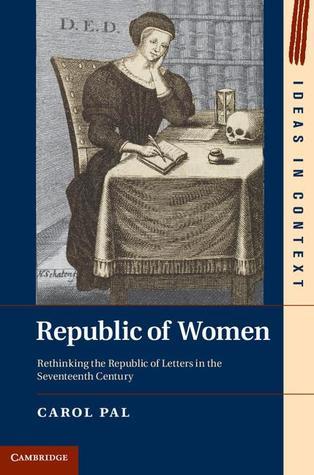

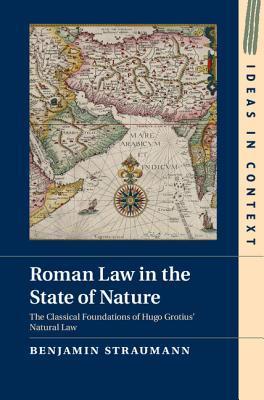
Books in series

#75
Republic of Women
Rethinking the Republic of Letters in the Seventeenth Century
2012
Republic of Women recaptures a lost chapter in the narrative of intellectual history. It tells the story of a transnational network of female scholars who were active members of the seventeenth-century republic of letters and demonstrates that this intellectual commonwealth was a much more eclectic and diverse assemblage than has been assumed. These seven scholars – Anna Maria van Schurman, Princess Elisabeth of Bohemia, Marie de Gournay, Marie du Moulin, Dorothy Moore, Bathsua Makin and Katherine Jones, Lady Ranelagh – were philosophers, schoolteachers, reformers and mathematicians. They hailed from England, Ireland, Germany, France and The Netherlands. And together with their male colleagues – men like Descartes, Huygens, Hartlib and Montaigne – they represented the spectrum of contemporary approaches to science, faith, politics and the advancement of learning. Carol Pal uses their collective biography to reconfigure the intellectual biography of early modern Europe, offering a new, expanded analysis of the seventeenth-century community of ideas.

#79
Eucharist and the Poetic Imagination in Early Modern England
2013
The Reformation changed forever how the sacrament of the Eucharist was understood. This study of six canonical early modern lyric poets traces the literary afterlife of what was one of the greatest doctrinal shifts in English history. Sophie Read argues that the move from a literal to a figurative understanding of the phrase 'this is my body' exerted a powerful imaginative pull on successive generations. To illustrate this, she examines in detail the work of Southwell, Donne, Herbert, Crashaw, Vaughan and Milton, who between them represent a broad range of doctrinal and confessional positions, from the Jesuit Southwell to Milton's heterodox Puritanism. Individually, each chapter examines how Eucharistic ideas are expressed through a particular rhetorical trope; together, they illuminate the continued importance of the Eucharist's transformation well into the seventeenth century – not simply as a matter of doctrine, but as a rhetorical and poetic mode.

#82
Roman Law in the State of Nature
The Classical Foundations of Hugo Grotius' Natural Law
2015
Roman Law in the State of Nature offers a new interpretation of the foundations of Hugo Grotius' natural law theory. Surveying the significance of texts from classical antiquity, Benjamin Straumann argues that certain classical texts, namely Roman law and a specifically Ciceronian brand of Stoicism, were particularly influential for Grotius in the construction of his theory of natural law. The book asserts that Grotius, a humanist steeped in Roman law, had many reasons to employ Roman tradition and explains how Cicero's ethics and Roman law - secular and offering a doctrine of the freedom of the high seas - were ideally suited to provide the rules for Grotius' state of nature. This fascinating new study offers historians, classicists and political theorists a fresh account of the historical background of the development of natural rights, natural law and of international legal norms as they emerged in seventeenth-century early modern Europe.
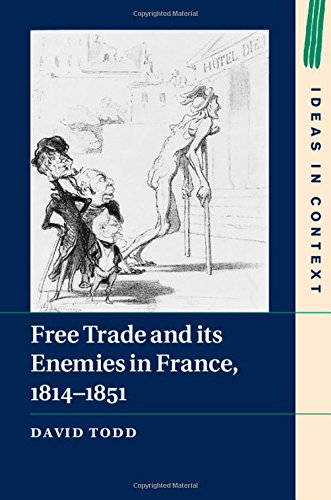
#84
Free Trade and its Enemies in France, 1814–1851
2015
In the aftermath of the French Revolution, advocates of protection against foreign competition prevailed in a fierce controversy over international trade. This groundbreaking study is the first to examine this 'protectionist turn' in full. Faced with a reaffirmation of mercantile jealousy under the Bourbon Restoration, Benjamin Constant, Jean-Baptiste Say and regional publicists advocated the adoption of the liberty of commerce in order to consolidate the new liberal order. But after the Revolution of 1830 a new generation of liberal thinkers endeavoured to reconcile the jealousy of trade with the discourse of commercial society and political liberty. New justifications for protection oscillated between an industrialist reinvention of jealousy and an aspiration to self-sufficiency as a means of attenuating the rise of urban pauperism. A strident denunciation of British power and social imbalances served to defuse the internal tensions of the protectionist discourse and facilitated its dissemination across the French political spectrum.
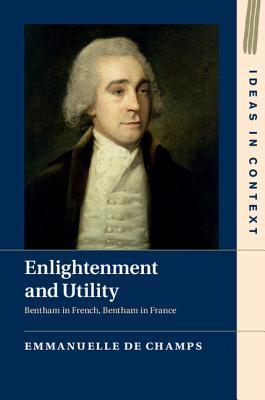
#86
Enlightenment and Utility
Bentham in French, Bentham in France
2015
Jeremy Bentham, the founder of classical utilitarianism, was a seminal figure in the history of modern political thought. This lively monograph presents the numerous French connections of an emblematic British thinker. Perhaps more than any other intellectual of his time, Bentham engaged with contemporary events and people in France, even writing in French in the 1780s. Placing Bentham's thought in the context of the French-language Enlightenment through to the post-Revolutionary era, Emmanuelle de Champs makes the case for a historical study of 'Global Bentham'. Examining previously unpublished sources, she traces the circulation of Bentham's letters, friends, manuscripts, and books in the French-speaking world. This study in transnational intellectual history reveals how utilitarianism, as a doctrine, was both the product of, and a contribution to, French-language political thought at a key time in European history. The debates surrounding utilitarianism in France cast new light on the making of modern Liberalism.
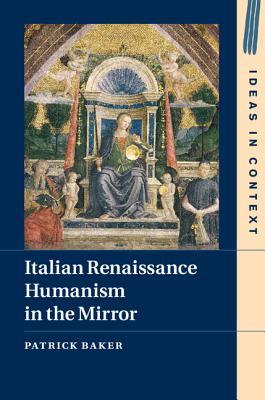
#88
Italian Renaissance Humanism in the Mirror
2015
This important study takes a new approach to understanding Italian Renaissance humanism, based not on scholarly paradigms or philosophical concepts but on a neglected yet indispensable the humanists' understanding of themselves. Through a series of close textual studies, Patrick Baker excavates what humanists thought was important about humanism, how they viewed their own history, what goals they enunciated, what triumphs they celebrated - in short, he attempts to reconstruct humanist identity. What emerges is a small, coherent community dedicated primarily not to political ideology, a philosophy of man, an educational ethos, or moral improvement, but rather to the pursuit of classical Latin eloquence. Grasping the significance this stylistic ideal had for the humanists is essential to understanding both their sense of themselves and the importance they and others attached to their movement. For eloquence was no mere aesthetic affair but rather appeared to them as the guarantor of civilisation itself.
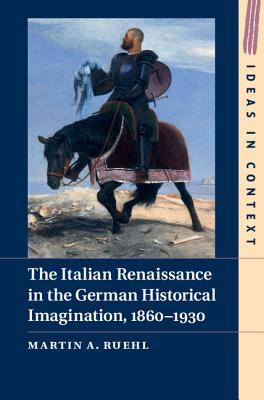
#89
The Italian Renaissance in the German Historical Imagination, 1860–1930
2015
Towards the end of the nineteenth century, Germany's bourgeois elites became enthralled by the civilization of Renaissance Italy. As their own country entered a phase of critical socioeconomic changes, German historians and writers reinvented the Italian Renaissance as the onset of a heroic modernity: a glorious dawn that ushered in an age of secular individualism, imbued with ruthless vitality and a neo-pagan zest for beauty. The Italian Renaissance in the German Historical Imagination is the first comprehensive account of the debates that shaped the German idea of the Renaissance in the seven decades following Jacob Burckhardt's seminal study of 1860. Based on a wealth of archival material and enhanced by more than one hundred illustrations, it provides a new perspective on the historical thought of Imperial and Weimar Germany, and the formation of a concept that is still with us today.
#91
Trust in Early Modern International Political Thought, 1598-1713
2017
Can there ever be trust between states? This study explores the concept of trust across different and sometimes antagonistic genres of international political thought during the seventeenth century. The natural law and reason of state traditions worked on different assumptions, but they mutually influenced each other. How have these traditions influenced the different concepts and discussions of trust-building? Bringing together international political thought and international law, Schröder analyses to what extent trust can be seen as one of the foundational concepts in the theorising of interstate relations in this decisive period. Despite the ongoing search for conditions of trust between states, we are still faced with the same structural problems. This study is therefore of interest not only to specialists and students of the early modern period, but also to everyone thinking about ways of overcoming conflicts which are aggravated by a lack of mutual trust.
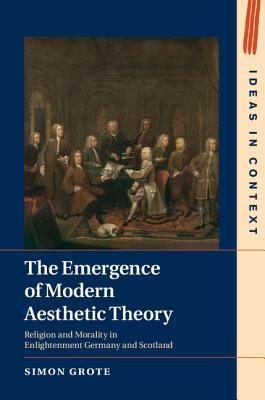
#92
The Emergence of Modern Aesthetic Theory
Religion and Morality in Enlightenment Germany and Scotland
2017
Broad in its geographic scope and yet grounded in original archival research, this book situates the inception of modern aesthetic theory – the philosophical analysis of art and beauty - in theological contexts that are crucial to explaining why it arose. Simon Grote presents seminal aesthetic theories of the German and Scottish Enlightenments as outgrowths of a quintessentially Enlightenment the search for a natural 'foundation of morality' and a means of helping naturally self-interested human beings transcend their own self-interest. This conclusion represents an important alternative to the standard history of aesthetics as a series of preludes to the achievements of Immanuel Kant, as well as a reinterpretation of several canonical figures in the German and Scottish Enlightenments. It also offers a foundation for a transnational history of the Enlightenment without the French philosophes at its centre, while solidly endorsing historians' growing reluctance to call the Enlightenment a secularising movement.
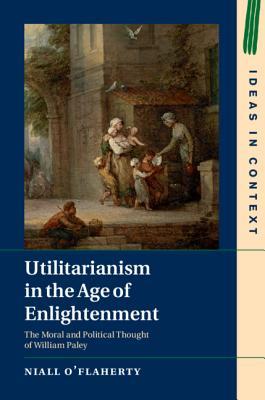
#93
Utilitarianism in the Age of Enlightenment
The Moral and Political Thought of William Paley
2018
This is the first book-length study of one of the most influential traditions in eighteenth-century Anglophone moral and political thought, 'theological utilitarianism'. Niall O'Flaherty charts its development from its formulation by Anglican disciples of Locke in the 1730s to its culmination in William Paley's work. Few works of moral and political thought had such a profound impact on political discourse as Paley's Principles of Moral and Political Philosophy (1785). His arguments were at the forefront of debates about the constitution, the judicial system, slavery and poverty. By placing Paley's moral thought in the context of theological debate, this book establishes his genuine commitment to a worldly theology and to a programme of human advancement. It thus raises serious doubts about histories which treat the Enlightenment as an entirely secular enterprise, as well as those which see English thought as being markedly out of step with wider European intellectual developments.
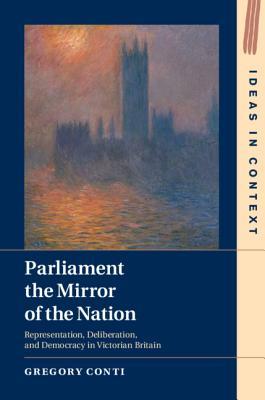
#94
Parliament the Mirror of the Nation
Representation, Deliberation, and Democracy in Victorian Britain
2019
The notion of 'representative democracy' seems unquestionably familiar today, but how did the Victorian era - the epoch when the modern democratic state was made - understand democracy, parliamentary representation, and diversity? In the famous nineteenth-century debates about representation and parliamentary reform, two interlocked ideals were of the greatest descriptive representation, that the House of Commons 'mirror' the diversity that marked society, and deliberation within the legislative assembly. These ideals presented a major obstacle to the acceptance of a democratic suffrage, which it was widely feared would produce an unrepresentative and un-deliberative House of Commons. Here, Gregory Conti examines how the Victorians conceived the representative and deliberative functions of the House of Commons and what it meant for parliament to be the 'mirror of the nation'. Combining historical analysis and political theory, he analyses the fascinating nineteenth-century debates among contending schools of thought over the norms and institutions of deliberative representative government, and explores the consequences of recovering this debate.
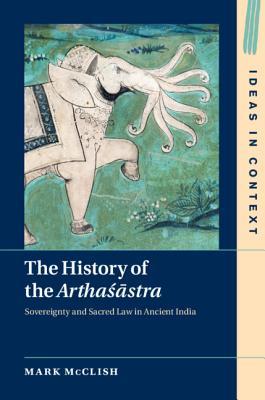
#95
The History of the Arthasastra
Sovereignty and Sacred Law in Ancient India
2019
The Arthaśāstra is the foundational text of Indic political thought and ancient India's most important treatise on statecraft and governance. It is traditionally believed that politics in ancient India was ruled by religion; that kings strove to fulfil their sacred duty; and that sovereignty was circumscribed by the sacred law of dharma. Mark McClish's systematic and thorough evaluation of the Arthaśāstra's early history shows that these ideas only came to prominence in the statecraft tradition late in the classical period. With a thorough chronological exploration, he demonstrates that the text originally espoused a political philosophy characterized by empiricism and pragmatism, ignoring the mandate of dharma altogether. The political theology of dharma was incorporated when the text was redacted in the late classical period, which obscured the existence of an independent political tradition in ancient India altogether and reinforced the erroneous notion that ancient India was ruled by religion, not politics.
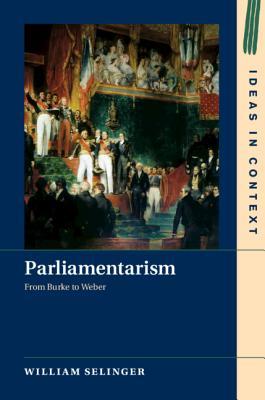
#96
Parliamentarism
From Burke to Weber
2019
For eighteenth- and nineteenth-century authors such as Burke, Constant, and Mill, a powerful representative assembly that freely deliberated and controlled the executive was the defining institution of a liberal state. Yet these figures also feared that representative assemblies were susceptible to usurpation, gridlock, and corruption. Parliamentarism was their answer to this a constitutional model that enabled a nation to be truly governed by a representative assembly. Offering novel interpretations of canonical liberal authors, this history of liberal political ideas suggests a new paradigm for interpreting the development of modern political thought, inspiring fresh perspectives on historical issues from the eighteenth to early twentieth centuries. In doing so, Selinger suggests the wider significance of parliament and the theory of parliamentarism in the development of European political thought, revealing how contemporary democratic theory, and indeed the challenges facing representative government today, are historically indebted to classical parliamentarism.
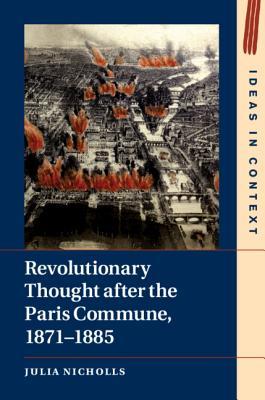
#97
Revolutionary Thought after the Paris Commune, 1871–1885
2019
This first comprehensive account of French revolutionary thought in the years between the crushing of France's last nineteenth-century revolution and the re-emergence of socialism as a meaningful electoral force offers new interpretations of the French revolutionary tradition. Drawing together material from Europe, North America, and the South Pacific, Julia Nicholls pieces together the nature and content of French revolutionary thought in this often overlooked era. She shows that this was an important and creative period, in which activists drew upon fresh ideas they encountered in exile across the world to rebuild a revolutionary movement that was both united and politically viable in the changed circumstances of France's new Third Republic. The relative success of these efforts, moreover, has significant implications for the ways in which we understand the founding years of the Third Republic, the nature of the modern revolutionary tradition, and the origins of European Marxism.
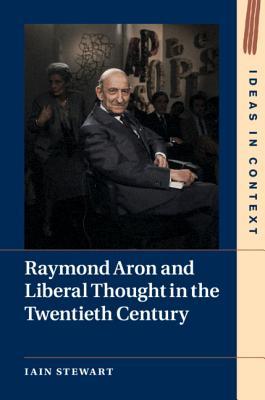
#98
Raymond Aron and Liberal Thought in the Twentieth Century
2019
Raymond Aron is widely regarded as the most important figure in the history of twentieth-century French liberalism. Yet his status within the history of liberal thought has been more often proclaimed than explained. Though he is frequently lauded as the inheritor of France's liberal tradition, Aron's formative influences were mostly non-French and often radically anti-liberal thinkers. This book explains how, why, and with what consequences he belatedly defined and aligned himself with a French liberal tradition. It also situates Aron within the larger histories of Cold War liberalism and decolonization, re-evaluating his contribution to debates over totalitarianism, the end of ideology, and the Algerian War. By exposing the enduring importance of Aron's student political engagements for the development of his thought, Iain Stewart challenges the prevailing view of Aron's early intellectual trajectory as a journey from naïve socialist idealism to mature liberal realism, offering a new critical perspective on one of the twentieth century's most influential intellectuals.
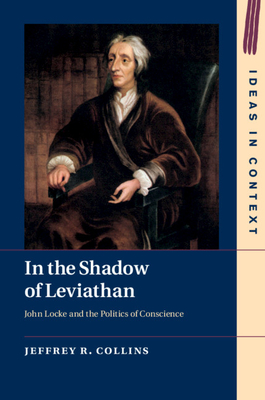
#100
In the Shadow of Leviathan
John Locke and the Politics of Conscience
2020
Thomas Hobbes and John Locke sit together in the canon of political thought but are rarely treated in common historical accounts. This book narrates their intertwined careers during the Restoration period, when the two men found themselves in close proximity and entangled in many of the same political conflicts. Bringing new source material to bear, In the Shadow of Leviathan establishes the influence of Hobbesian thought over Locke, particularly in relation to the preeminent question of religious toleration. Excavating Hobbes' now forgotten case for a prudent, politique toleration gifted by sovereign power, Jeffrey R. Collins argues that modern, liberal thinking about toleration was transformed by Locke's gradual emancipation from this Hobbesian mode of thought. This book investigates those landmark events - the civil war, Restoration, the popish plot, the Revolution of 1688 - which eventually forced Locke to confront the limits of politique toleration, and to devise an account of religious freedom as an inalienable right.
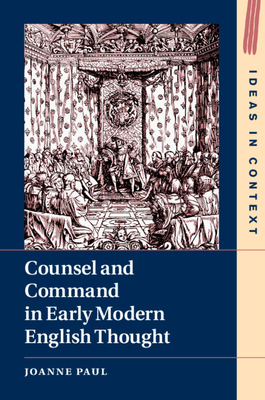
#102
Counsel and Command in Early Modern English Thought
2020
While it has often been recognised that counsel formed an essential part of the political discourse in early modern England, the precise role that it occupied in the development of political thinking has remained obscure. This comprehensive and rigorous study of early modern English political counsel establishes the importance of the relationship between political counsel and the discourse of sovereignty. Tracing the changes and evolution of writings on political counsel during the 'monarchy of counsel', from the end of the Wars of the Roses to the end of the English Civil War, Joanne Paul examines English thought in its domestic and transnational context, providing an original account of the relationship between counsel and emerging conceptions of sovereignty. Formed at the conjunction of the history of political thought and English political history, this book grounds textual analysis within the context of court politics, intellectual and patronage networks, and diplomacy.
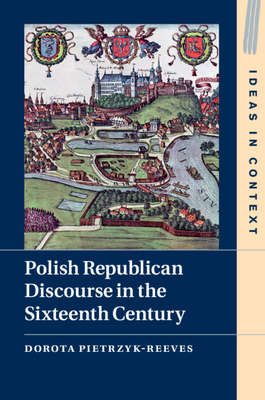
#103
Polish Republican Discourse in the Sixteenth Century
2020
Exploring republican ideas and concepts that developed in sixteenth-century Poland under the impact of humanism and the Renaissance, as well as political and constitutional changes, this is a landmark study of republican discourse in sixteenth-century Poland-Lithuania. It provides a conceptual and contextual analysis of the rich political literature and debate which animated intellectual life and political reasoning during the Polish-Lithuanian Commonwealth, and effectively demonstrates its republican character. Using a comparative perspective, Dorota Pietrzyk-Reeves situates the Polish republican discourse within both the classical and early modern republican traditions, bringing together contexts and ideas that have traditionally been overlooked by scholars of early modern Europe. In addition, she also underlines the originality of Polish concepts such as the relationship between law, liberty and virtue as key elements of a well-ordered commonwealth and the vision of a mixed res publica that had a monarchical character. This book is an invaluable resource for anyone interested in European intellectual history and the early modern republican tradition.
#104
Constituent Power
A History
2020
From the French Revolution onwards, constituent power has been a key concept for thinking about the principle of popular power, and how it should be realised through the state and its institutions. Tracing the history of constituent power across five key moments - the French Revolution, nineteenth-century French politics, the Weimar Republic, post-WWII constitutionalism, and political philosophy in the 1960s - Lucia Rubinelli reconstructs and examines the history of the principle. She argues that, at any given time, constituent power offered an alternative understanding of the power of the people to those offered by ideas of sovereignty. Constituent A History also examines how, in turn, these competing understandings of popular power resulted in different institutional structures and reflects on why contemporary political thought is so prone to conflating constituent power with sovereignty.
Authors

Martin A. Ruehl
Author · 1 book
Martin Ruehl took his BA from Cambridge and his PhD from Princeton. After a research fellowship at Queens’ College, he joined Sidney Sussex as College Lecturer and Director of Studies in History. Since 2007, he has been University Lecturer in the German Department and Director of Studies in MML at Trinity Hall. He continues to teach for the History Faculty at the undergraduate as well as graduate level and is an active member of the teaching staff for the MPhil in Political Thought and Intellectual History.
